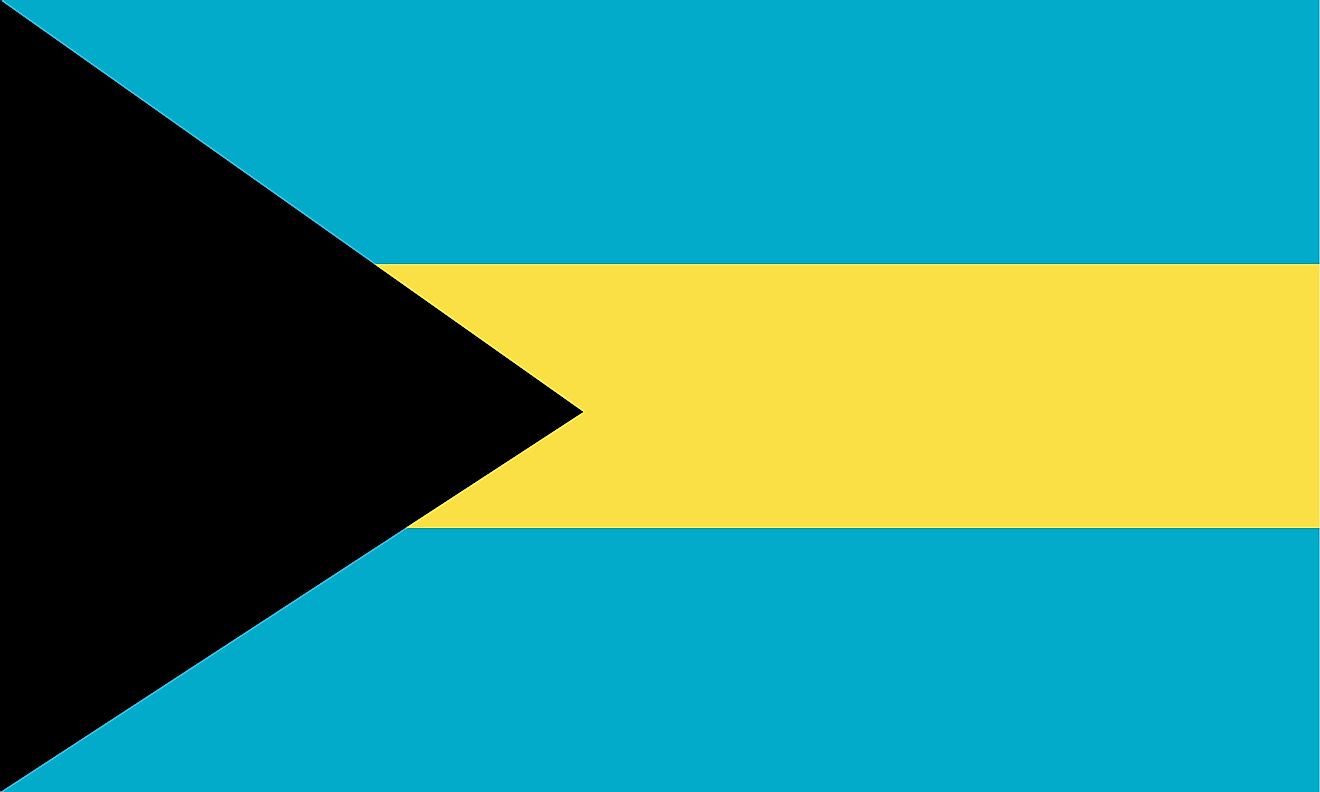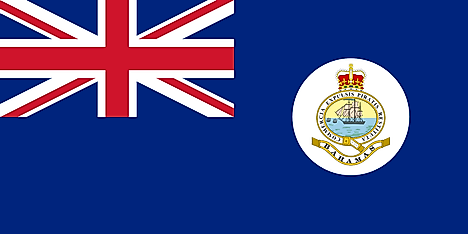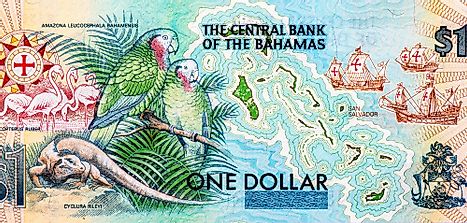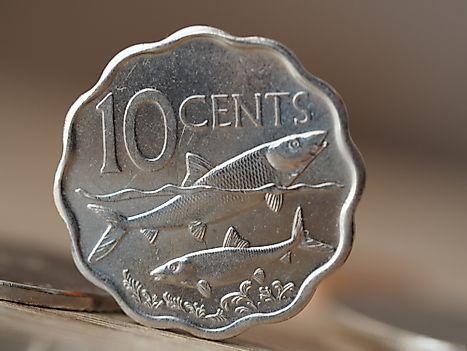Flags, Symbols & Currency of Bahamas

The flag of the Bahamas was officially adopted on July 10, 1973. The flag was designed by Rev. Dr. Hervis Bain – a Bahamian artist.
The National Flag of the Commonwealth of The Bahamas features three equal horizontal bands of aquamarine (top), gold, and aquamarine; with a black equilateral triangle based on the hoist side. The gold band color represents the golden beaches of the islands surrounded by the aquamarine sea. The two-aquamarine blue color bands symbolize the Caribbean Sea and the black color represents the strength, vigor, and force of a united people. The black equilateral triangle pointing towards the body of the flag indicates the enterprise and determination of the Bahamian people to develop and possess the rich resources of land and sea. The flag has a width-to-length proportion ratio of 1:2.
History of the Flag of The Bahamas
Before 1973, the flag of The Bahamas was a British blue ensign with the colony’s seal. The seal displayed the colony’s motto below a picture of two pirate ships fleeing from the British Navy. The flag was designed in the honor of the British sailors who hunted pirates from the Bahamas during the colony’s early history. This flag did not receive government approval until 1964. After this, The Bahamas began to negotiate their Independence and began to search for a new flag. A competition was organized to pick the new flag design. The government chose to create The Bahamas Flag by combining aspects of several different design submissions that were received during the competition. The final design of the current flag was first flown on July 10, 1973 – the first day of the Nation’s Independence from Great Britain.
Symbols of Bahamas
The National Coat of Arms of Bahamas

The Coat of Arms of The Bahamas was officially adopted on December 7, 1971. It contains a shield with the national symbols as its focal point. On top of the shield is a conch shell in front of a Panache of Palm Fronds - represents the varied marine life of the island chain. This rests on top of a Royal Helmet, below which is the actual shield. The main symbol of the shield is a ship, reported to represent the Santa María of Christopher Columbus; which is sailing beneath a sun. The animals supporting the shield are the national animals - a Marlin and a Flamingo. The flamingo is located upon the land and the marlin upon the sea. The national motto: “Forward, Upward, Onward Together” is found at the bottom. The vibrant colors of the coat of arms are also intended to point to a bright future for the islands. They are also reputed to have been maintained due to their attractiveness to tourists.
National Motto
"Forward, Upward, Onward, Together"
National Anthem
- Anthem Title: "March on, Bahamaland"
- Music Composer: Timothy Gibson
- Lyricist: Timothy Gibson
- Date of Adoption: July 10, 1973
"March On, Bahamaland" is the national anthem of The Bahamas. The anthem has been composed and authored by Timothy Gibson. It was officially adopted as the national anthem on July 10, 1973, when the country gained independence from the United Kingdom. Since Bahamas retains the British Monarch as their Head of State, the anthem "God Save the Queen" serves as the royal anthem of Bahamas.
"March On, Bahamaland"
Lift up your head to the rising sun, Bahamaland;
March on to glory, your bright banners waving high.
See how the world marks the manner of your bearing!
Pledge to excel through love and unity.
Pressing onward, march together
to a common loftier goal;
Steady sunward, tho' the weather
hide the wide and treacherous shoal.
Lift up your head to the rising sun, Bahamaland,
'Til the road you've trod lead unto your God,
MARCH ON, BAHAMALAND!
The Currency of Bahamas is the Bahamian dollar
The official currency of The Bahamas is the Bahamian dollar ($, B$, BSD). Since 1996, The Bahamian dollar has served as the country's official currency. It exists in denominations of $1/2, $1, $3, $5, $10, $20, $50, and $100. The Bahamian currency is minted by the Central Bank of the Bahamas. The Bahamian dollar is also used in the Turks and Caicos Islands.
Bahamian Coins
Coins were introduced in the Bahamas in 1966. Denominations included 1 and 2 dollars, and 50, 25, 15, 10, 5, and 1 cent coins. These were struck in nickel-brass, cupronickel, and silver. However, the silver coins were not circulated in the economy after 1966. The current Bahamian 1 cent coin is slightly smaller than a US dime. However, the 5 and 25 cent coins are equal in size to the 5 and 25 cents US coins but have different metal compositions. All coins have the Bahamian Court of Arms inscribed on one side, while the reverse face contains objects of Bahamian culture, such as pineapple, two bonefish, three starfish, hibiscus, and a native sloop. Bahamians portray great honor for their culture with these objects. It should be noted that the 15 cents, 50 cents, $1, $2, and $5 coins are seldom used.
Bahamian Banknotes
Bahamian banknotes were also introduced in 1966 in denominations of 100, 50, 20, 10, 5, 3, 1, and ½ dollars. The Bahamas Money Authority was responsible for issuing the banknotes starting in 1968, and after 1974 all banknotes were printed by the Central Bank of the Bahamas. The banknotes are equal in physical size to the US dollar notes. The Bahamian currency has experienced different changes to reduce problems of forgery. Most recently, the counterfeit-proof “Counterfeit Resistant Integrated Security Product (CRISP)” formula was introduced. All notes previously included the portrait of Queen Elizabeth II, but then featured portraits of former Bahamian politicians. More recently, however, the portrait of the older Queen Elizabeth II has been reintroduced on the $10 and $100 banknotes. The current Bahamas dollar notes are dark green, mint green, or brown. They measure 156 mm long and 67 mm wide in size. Security features can include watermarks, security threads, see-through features of the Sand dollar, 100% cotton banknote paper, and latent images. Additionally, the $1/2, $3, and $100 notes are rarely used today.
Historical Currencies of Bahamas
The Bahamian dollar has not always been the currency of the Bahamas. Initially, the pound was used, until 1966 when it was replaced by the Bahamian dollar at a rate of 1 dollar to 7 shillings. The sterling to dollar rate was then fixed at £1 equal to $2.80 following the system of parity with the US dollar. The $3 bills and the 15 cent coins were minted during the transition from pounds to dollars to assist in decimalization.










